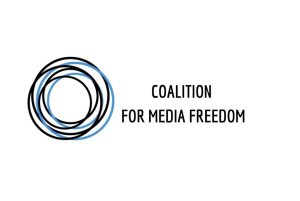MFRR partner organisations in Europe provide updates to annual EU rule of law monitoring tool: Updates on some of the biggest developments and threats to media freedom and pluralism across European Union Member States throughout 2023 were submitted to the EU Commission’s annual Rule of Law Report by partner organisations of the Media Freedom Rapid Response (MFRR).
On 15 January 2024, MFRR consortium partners Free Press Unlimited (FPU), International Press Institute (IPI) and the Osservatorio Balcani Caucaso Transeuropa (OBCT) filed detailed submissions to the report on the topic of media freedom and pluralism in Hungary, Greece, Italy, Netherlands and the Czech Republic.
The joint and individual submissions provide information of major developments in the media freedom landscapes in each country and assess progress – or lack of progress – made on the EU Commission’s recommendations to each state in the 2023 report. They are based on advocacy and monitoring work carried out by MFRR partners throughout the year.
Key rule of law issues examined in the information submitted included the passing of the recent Sovereignty Protection Act by the government of Victor Orbán in Hungary, for which MFRR partners have called for infringement proceedings from the EU Commission. The submission on Hungary also detailed the major wave of cyber-attacks on critical and independent media outlets in 2023.
Submissions on Greece examined the ongoing state of total impunity for the 2021 murder of crime reporter Giorgos Karaivaz, the widow of whom MFRR partners met in Athens during a press freedom mission to the country in September 2023. The submission also examines a previous case of impunity for the assassination of a journalist and addresses the wider landscape for the safety of journalists in Greece, and efforts by the government to address it. The submission reflects especially on the effectiveness of the government Task Force for the safety of journalists – the establishment of which was a key recommendation in previous reports.
The submission on Italy provides details on several attacks on independent journalism by the far-right coalition government of Prime Minister Giorgia Meloni throughout 2023. Among the indicators identified as deteriorating signals of the rule of law in Italy include a steep increase in vexatious lawsuits filed against the press by leading government ministers; an alarming defamation bill advanced by the ruling coalition which risks producing a chilling effect on press freedom; a bill forbidding transcripts’ publications of pre-trial detention orders, which risks severely restricting court reporting; and escalating political pressure on the public broadcaster RAI.
In the Czech Republic meanwhile, the submission instead detailed positive legal reforms undertaken by the centre-right government of Petr Fiala, including welcome changes which strengthened the system for appointments to the supervisory bodies of the public broadcaster and improved conflicts of interest law that stops politicians from owning media. This latter change forced the former Prime Minister, Andrej Babis, leader of the opposition ANO party, to sell Mafra media, one of the country’s largest media companies. It also sets out the lack of progress in other areas.
In the Netherlands, the submission voiced concern over media pluralism as the Dutch landscape is characterized by a high concentration of foreign media ownership. This became more prevalent with the recent announcement that DPG Media intends to take over RTL Group. Furthermore, the submission also highlighted several threats to press freedom and the safety of journalists, including the recent wiretapping scandal of journalists of de Correspondent by the Public Prosecution Office; transnational repression of both foreign and Dutch journalists; and the rise of SLAPPs and other forms of legal intimidation such as the abusive lawsuit against Het Financieele Dagblad, which MFRR partners deplored. The submission focused on several positive developments too, including increased funding and capacity for the journalist safety initiative Persveilig and the passing of a new law to criminalise doxing.
MFRR partners continue to support the Rule of Law Report as a valuable tool that increases scrutiny of threats to the rule of law and media freedom and empowers civil society and Member State governments to promote and enforce the rule of law in the EU. To strengthen the process further, MFRR partners call for the EU Commission to provide more detailed country-specific recommendations to Member States on all areas of work, including media freedom and pluralism. These should be more targeted and provide concrete reforms and improvements to be undertaken to media regulatory bodies, systems for state support to media, media transparency registers, and the establishment of bodies dedicated to strengthening the protection and security of journalists.
Our organisations remain committed to documenting, reporting and raising awareness about all threats and attacks on media freedom, media pluralism and independent journalism across the bloc on our Mapping Media Freedom platform and look forward to continuing the consortium’s monitoring, advocacy and support work in 2024.
Signed:
Free Press Unlimited (FPU)
International Press Institute (IPI)
OBC Transeuropa
European Centre for Press and Media Freedom (ECPMF
European Federation of Journalists (EFJ)
Source: EFJ




